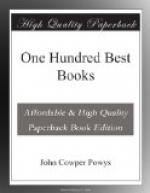3. The BACCHANALS. The Bacchae of Euripides. Translated by Professor Gilbert Murray.
Euripides, the favourite poet of John Milton and Goethe, is the most modern in feeling, the most romantic in mood of all the Greek poets. One is conscious that in his work, as in the sculpture of Praxiteles, the calm beauty of the Apollonian temper is touched by the wilder rhythm of the perilous music of Dionysus.
4. Horace. Any selection in Latin of The Odes of Horace and complete prose translation published by Macmillan.
Flawlessly hammered out, as if from eternal bronze—“aere perennius”—The Odes of Horace are the consummate expression of the pride, the reserve, the tragic playfulness, the epicurean calm, the absolute distinction of the Imperial Roman spirit. A few lines taken at random and learned by heart would act as a talisman in all hours to drive away the insolent pressure of the vulgar and common crowd.
5. Catullus. Any Latin edition and the prose translation published by Macmillan bound up with Tibullus.
Catullus, the contemporary of Julius Caesar, is, of all the ancient lyrical poets, the one most modern and neurotic in feeling. One discerns in his work, breathing through the ancient Roman reserve, the pressure of that passionate and rebellious reaction to life, which we enjoy in the most magical of all later poets from Villon to Verlaine.
6. Dante ’S divine comedy. Best edition the “Temple Classics,” in three small volumes, with the Italian original and English prose translation on opposite pages.
Dante’s poetry can legitimately be enjoyed in single great passages, of which there are more in the “Inferno” than in the other sections of the poem. His peculiar quality is a certain blending of mordant realism with a high and penetrating beauty. There is no need in reading him to vex oneself with symbolic interpretations. He is at his best, when from behind his scholastic philosophy, bursts forth, in direct personal betrayal, his pride, his humility, his passion, and his disdain.
7. Rabelais. The English translation with the Dore illustrations.
Rabelais is the philosopher’s Bible and his book of outrageous jests. He is the recondite cult of wise and magnanimous spirits. He reconciles Nature with Art, Man with God, and religious piety with shameless enjoyment. His style restores to us our courage and our joy; and his noble buffoonery gives us back the sweet wantonness of our youth. Rabelais is the greatest intellect in literature. No one has ever had a humor so large; an imagination so creative, or a spirit so world-swallowing, so humane, so friendly.
8. Candide. Any French edition or English translation.
Voltaire was a true man of action, a knight of the Holy Ghost. He plunged fiercely into the human arena, and fought through a laborious life, against obscurantism, stupidity and tyranny. He had a clear-cut, aristocratic mind. He hated mystical balderdash, clumsy barbarity, and stupid hypocrisy. Candide is not only a complete refutation of optimism; it is a book full of that mischievous humor, which has the power, more than anything else, of reconciling us to the business of enduring life.




